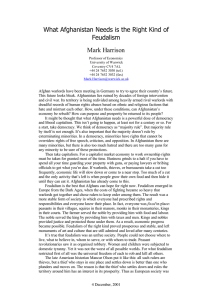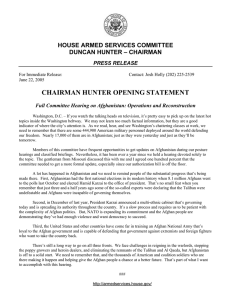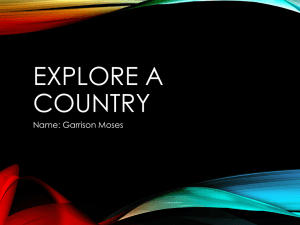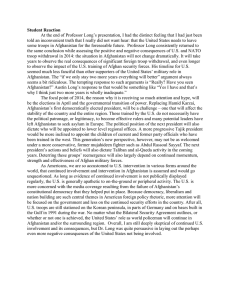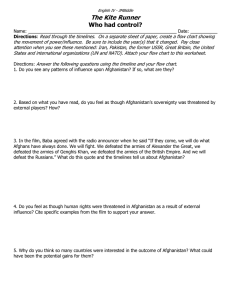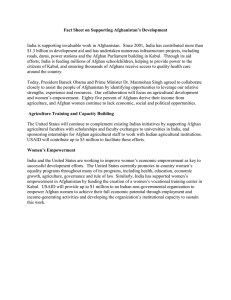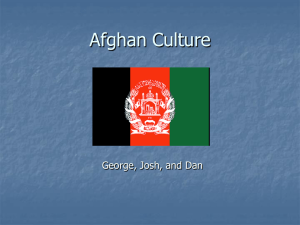What Afghanistan Needs is the Right Kind of Feudalism Mark Harrison
advertisement
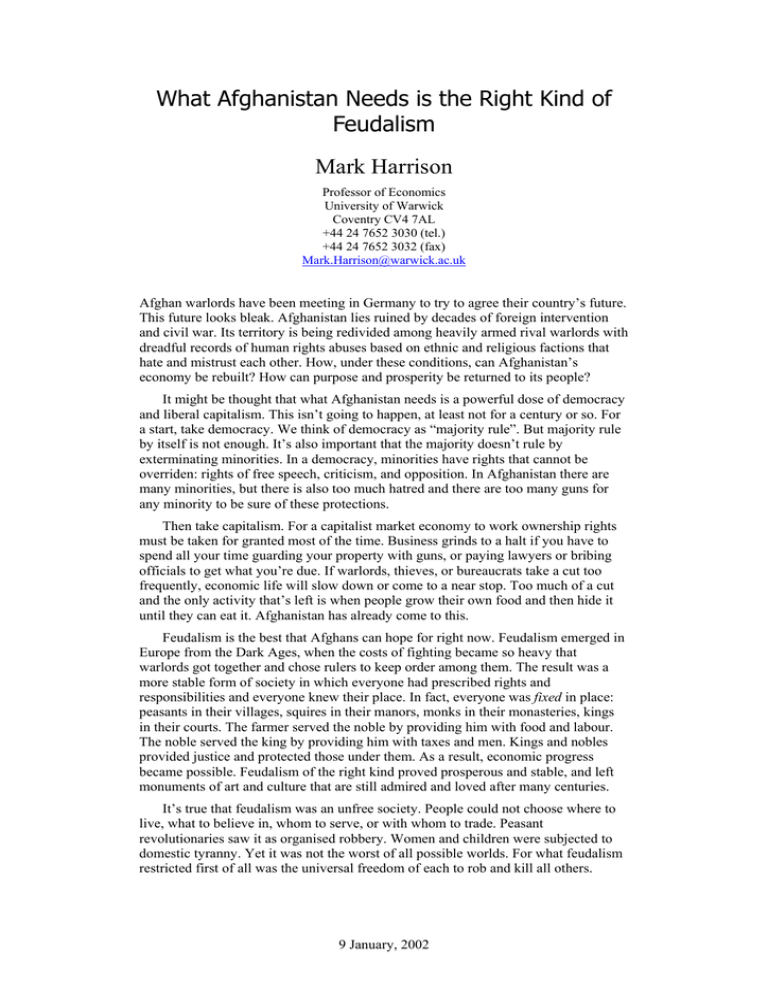
What Afghanistan Needs is the Right Kind of Feudalism Mark Harrison Professor of Economics University of Warwick Coventry CV4 7AL +44 24 7652 3030 (tel.) +44 24 7652 3032 (fax) Mark.Harrison@warwick.ac.uk Afghan warlords have been meeting in Germany to try to agree their country’s future. This future looks bleak. Afghanistan lies ruined by decades of foreign intervention and civil war. Its territory is being redivided among heavily armed rival warlords with dreadful records of human rights abuses based on ethnic and religious factions that hate and mistrust each other. How, under these conditions, can Afghanistan’s economy be rebuilt? How can purpose and prosperity be returned to its people? It might be thought that what Afghanistan needs is a powerful dose of democracy and liberal capitalism. This isn’t going to happen, at least not for a century or so. For a start, take democracy. We think of democracy as “majority rule”. But majority rule by itself is not enough. It’s also important that the majority doesn’t rule by exterminating minorities. In a democracy, minorities have rights that cannot be overriden: rights of free speech, criticism, and opposition. In Afghanistan there are many minorities, but there is also too much hatred and there are too many guns for any minority to be sure of these protections. Then take capitalism. For a capitalist market economy to work ownership rights must be taken for granted most of the time. Business grinds to a halt if you have to spend all your time guarding your property with guns, or paying lawyers or bribing officials to get what you’re due. If warlords, thieves, or bureaucrats take a cut too frequently, economic life will slow down or come to a near stop. Too much of a cut and the only activity that’s left is when people grow their own food and then hide it until they can eat it. Afghanistan has already come to this. Feudalism is the best that Afghans can hope for right now. Feudalism emerged in Europe from the Dark Ages, when the costs of fighting became so heavy that warlords got together and chose rulers to keep order among them. The result was a more stable form of society in which everyone had prescribed rights and responsibilities and everyone knew their place. In fact, everyone was fixed in place: peasants in their villages, squires in their manors, monks in their monasteries, kings in their courts. The farmer served the noble by providing him with food and labour. The noble served the king by providing him with taxes and men. Kings and nobles provided justice and protected those under them. As a result, economic progress became possible. Feudalism of the right kind proved prosperous and stable, and left monuments of art and culture that are still admired and loved after many centuries. It’s true that feudalism was an unfree society. People could not choose where to live, what to believe in, whom to serve, or with whom to trade. Peasant revolutionaries saw it as organised robbery. Women and children were subjected to domestic tyranny. Yet it was not the worst of all possible worlds. For what feudalism restricted first of all was the universal freedom of each to rob and kill all others. 9 January, 2002 2 The late American historian Mancur Olson put it like this: such rulers are thieves, but a thief who stays in one place and settles down is better than one who plunders and moves on. The reason is that the thief who settles and rules the territory around him has an interest in its prosperity. He protects the people under him in his own self– interest, because they are his assets. To enlarge his own revenues he gives them legal rights and provides them with services to encourage the economic activity that he can tax. Thus as European society was stabilised on feudal lines, dukes and kings built roads and towns, provided schools, and organised trade. They taxed the trade, which was bad, but they prevented others from taxing or robbing it and this at least was good. They spent heavily on armies and navies; they also patronised the arts and sciences. They provided law: the laws were biased in their favour, but at least there were laws, not just the law of the jungle. Even the hereditary character of the lords and monarchy, which now seems laughably antique, had an important function. By agreeing to the hereditary principle, the nobles gave incentives even to a dying ruler to care about the stability and prosperity of the kingdom he would bequeath to his children, and ensured that the ruler’s death would be followed by an orderly succession, not civil war. It will be a step forward if the Afghan leaders meeting in Bonn can agree upon this kind of society. But they will only do so if their self–interest lies there, so that they recognise the alternatives of unbridled rivalry and civil war without end as worse. The thief who controls a province promotes its prosperity only while he can be sure some other thief will not invade it and drive him out. The Afghan warlords need to agree some rules of mutual self-restraint. Everything must start from this. Otherwise there will be no rules at all and Afghanistan will return to civil war; or a dictator will emerge to restrain the warlords by force, and Afghanistan will have to undergo a new tyranny. What kind of feudalism? It was important for European countries that their feudalism was of the right kind. The ruler had to accept limits on his power in relation to both the nobility and all citizens. In England the king’s responsibilities were agreed among the nobles and written down in the Magna Charta of 1215 which also set out principles of justice, ownership, and trade. The Magna Charta stopped the king from robbing, imprisoning, and killing without lawful reason. The result was that the English monarchy became more pluralistic than tyrannical. The state and religion, although not fully separate, at least retained separate powers. Women had some rights, although fewer than men. There was a Parliament, although at first it was only for the nobles. For England the next few centuries included a necessary civil war to cut down the ambitions of the Tudors and Stewarts, and a period in which burgeoning democracy nearly descended into wholesale corruption. There were many colonial wars in which Englishmen behaved badly to the Scots, Irish, Africans, Indians, and others. At the same time they continued to mistreat large numbers of English women and children and also each other. British history has not been a Sunday School picnic. Still today there is enough poverty and discrimination at home that we cannot afford to be complacent. But by global standards Britain has become a relatively prosperous and stable society. If you were born here or can get in, it is a freer place to live than most. Is feudalism really the best that Afghans can hope for? I do not mean that we should silence Afghan democrats when they ask for elections or Afghan women when they demand education and a visible role in society. Part of the deal should be their right to speak and be heard. But we should not blame Afghan rulers who do not deliver this immediately and in full. There are worse things they can do, such as return Afghanistan to a perpetual state of internal warfare. 3 There are implications for the west. The decisive step in reconstituting Afghanistan is to establish the rights of the rulers, not of the ordinary people. If ordinary Afghans are to gather more rights than they have at present, they will flow at first from the self–interest of the rulers, not from ideals of citizenship and democracy or conventions on human rights. Only a stable division of rights of the rulers will provide this. We shouldn’t expect too much from Afghanistan’s new rulers. The big rewards that the west can offer, such as dollars for reconstruction and development, should be delivered to those that show commitments to peace, to rule that is governed by law, and to separating religion gradually from the state. As for democracy and a market economy in Afghanistan, these lie in the future. Mancur Olson also wrote that democracy had the best chance to evolve when it was hard for one ruler or group to impose their will on all the others, leading to an absolutist dictatorship. To encourage power-sharing, and make it difficult for new big or little tyrants to emerge, we should distribute aid to projects and communities that cross the boundaries of each warlord’s domain, valley by valley. Perhaps a period of enlightened, pluralistic feudalism may then permit Afghanistan to evolve over the next few centuries into a more decent place for its citizens to live.
